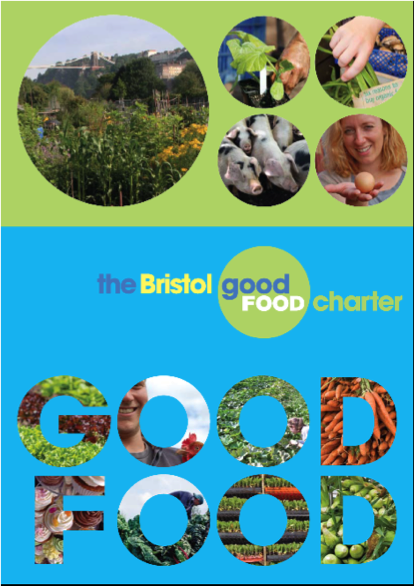Bristol Good Food Charter
May 28, 2013
Contributor: Steven Marriott, Bristol
Workshop: Social inclusion, job creation, economics / Involving various population groups in sustainable food transition
An engagement tool promoting the Bristol Food Policy Council message and encouraging people and organisations to take positive action.

The motivation was to develop a tool to promote the existence of the Food Policy Council and create a dialogue entry point with people and organisations to create a relationship from which the FPC messages could be discussed in a receptive framework.
The tool is the Bristol Food Charter. In developing the Bristol Good Food Charter we set up a sub group of the main Food Policy Council to examine the core message we need to send out to people. The key to this message was not to be prescriptive but to create a dialogue entry point so we could engage people in issues around food. That entry point is “Good Food”. This allows an exploration of their understanding of good food and then we can start to develop the discussion:
- Good taste – but some foods taste good but are very unhealthy
- Cheap – but avoids health and environmental costs
- Easy to access – but only by car, excludes many people
And so on……
So in effect we have developed: “a brand”, a message, and deconstructed “sustainable food” into a meaningful concept for most people.
The brand is “Bristol Good Food”. The message is: Good food is vital to the quality of people’s lives in Bristol. As well as being tasty, healthy and affordable the food we eat should be good for nature, good for workers, good for local businesses and good for animal welfare. So in this message you can see the social, environmental and economic elements clearly stated.
The charter doesn’t stand alone but is a key part of a communications strategy that sees the charter and message promoted at food events in the city. Also good practice people identify is promoted through the newsletter and website in the form of case studies. A more recent communications toolkit has also been developed.
- It promotes the concept of sustainable food in an engaging way.
- It provides signposting to good practice.
Specific messages are: as well as being tasty, healthy and affordable the food we eat should be good for nature, good for workers, good for local businesses and good for animal welfare
We recognise charters are very limited in their value, often only bringing in people that are already converted to the message. However, part of the value of this exercise has been the development of the brand and the message. It is also important that even those already partly signed up to the core values being expressed become active champions of the full message to align all of the active vectors in the community. This will never be perfect but we can go so way towards this goal. So the charter was only the first step in developing a communications package.
The lesson here is the process, taking time to develop a message that has clear local identity, a message that anyone can understand and converse on, but has clear principles behind it. We tested this idea through on street interviews before our final product was agreed. Also, there is no point in preparing in product unless it is part of a clear communications strategy.
The one part of the process I think could be improved is the suggested actions. I think this is very limited and there could be more powerful ways of suggesting positive action. So ideas for this would be very welcome.